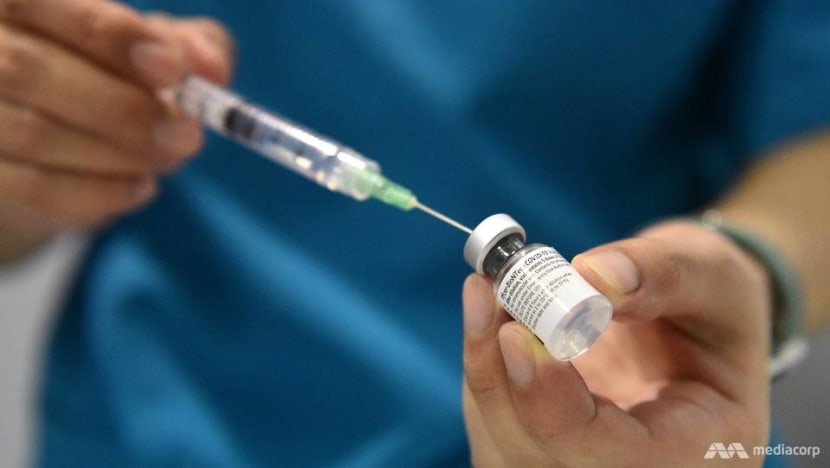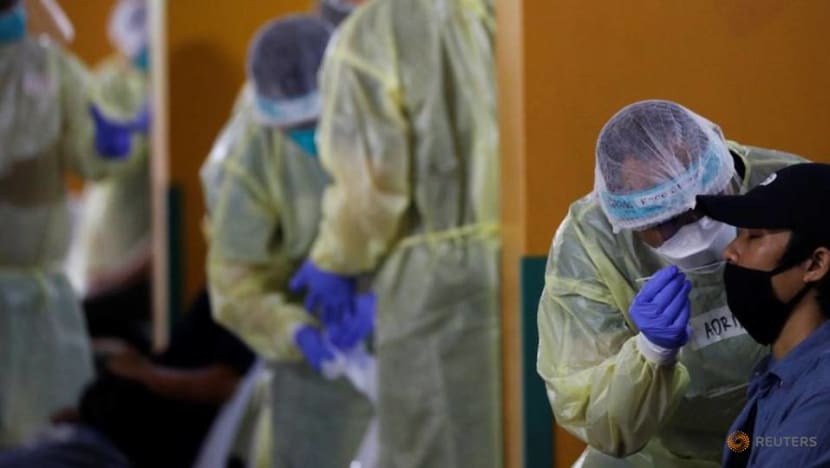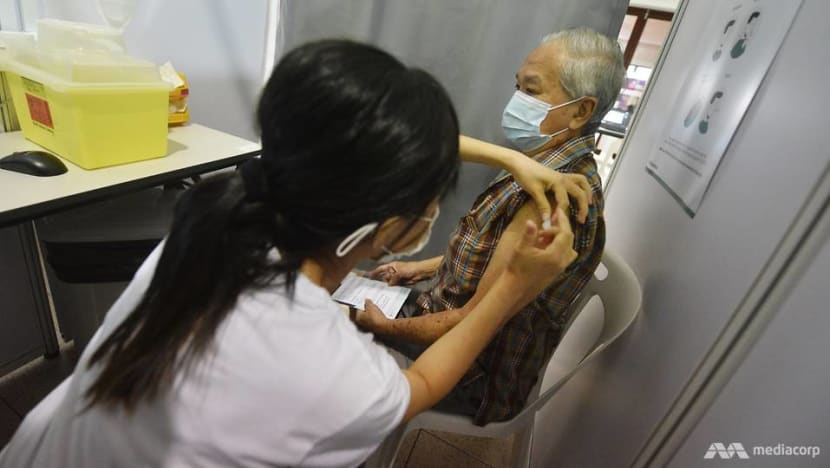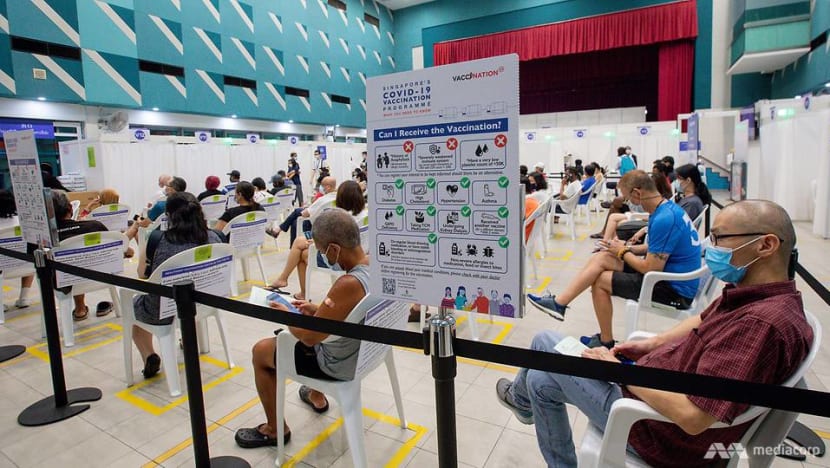Getting vaccinated against COVID-19 can lessen the severity of symptoms: Experts

A healthcare worker prepares a dose of the Pfizer-BioNTech COVID-19 vaccine at Tanjong Pagar Community Centre on Jan 27, 2021. (Photo: CNA/Jeremy Long)
SINGAPORE: While getting vaccinated against COVID-19 may not prevent you from contracting the disease, it could lessen the severity of your symptoms, according to experts and published data on the Ministry of Health’s (MOH) website.
As of Tuesday (Jun 29), out of 610 local cases reported since Apr 28 who had not received any dose of the vaccine, 9.2 per cent developed serious illness, needing oxygen supplementation or admission into intensive care units (ICUs). Six died from complications related to COVID-19.
In contrast, no COVID-19 fatalities have been reported from the pool of 289 patients who had either received one or two doses of the vaccine.
The proportion of patients developing serious illness was also lower in the partially vaccinated group, with 7.3 per cent of patients who had received one dose of the vaccine requiring supplemental oxygen or admission into ICU. As for those who were fully vaccinated, only 1 per cent needed supplemental oxygen.

During a recent surge of cases between Jun 12 and Jun 24, the National Centre for Infectious Diseases (NCID) said it observed that those who were aged 60 and above made up 35.5 per cent of the total number of cases.
The Delta variant has an age-associated severe outcome, it added.
This means that the older a person is, the higher the risk of severe illness, explained Professor Leo Yee Sin, executive director of NCID.
“Based on our observations thus far, no vaccinated individual needed to be mechanically ventilated, a stark contrast to those unvaccinated,” she said.
“In the face of the Delta variant, we continue to observe fewer symptomatic cases and fewer severe cases among those vaccinated even in the older age group,” she added.
READ: Benefits of mRNA COVID-19 vaccines 'continue to outweigh' risks: Singapore expert committee
Responding to CNA’s queries, MOH said that based on local cases reported since Apr 11, the median length of stay in an acute hospital was five days for a fully vaccinated patient and eight days for a non-fully vaccinated patient.
“In many cases, the hospital stays are to enable multiple tests to be completed to ascertain the individual’s infectious status and to keep patients long enough to check that their conditions are unlikely to deteriorate,” said MOH, adding that patients are discharged once they are no longer deemed infectious, regardless of their vaccination status.
READ: Shorter wait for Moderna COVID-19 vaccine slots, experts urge residents not to wait to get shots
At a recent press conference held by the multi-ministry task force tackling COVID-19, Health Minister Ong Ye Kung noted that a local study, which analysed 29,000 people quarantined in Singapore including those who were unvaccinated, found that the COVID-19 vaccines offered about 79.1 per cent protection against the disease.
This, he said, was “not very far off” from a study conducted in the UK, which found that the vaccination offered a protection rate of 88 per cent.
VACCINATION CRUCIAL
As COVID-19 becomes endemic in Singapore, experts CNA spoke to said boosting vaccination rates will be crucial to prevent the country’s healthcare system from being overwhelmed.

“When we start to reach an endemic state, it means that there will be a baseline number of people that will be affected on a daily, weekly or monthly basis, and clearly we don't want these people to be taking up our intensive care unit (ICU) beds,” said Prof Teo Yik Ying, dean of the National University of Singapore's Saw Swee Hock School of Public Health.
“It can, indeed, exert quite a significant impact on our healthcare system ... We really want this percentage (of patients who develop serious illness) to be as low as possible,” he said.
READ: COVID-19: What happens when a pandemic becomes endemic?
Until everyone is vaccinated, COVID-19 will continue to pose a risk to communities as well as the country’s healthcare system, said Prof Dale Fisher, who chairs the World Health Organization’s Global Outbreak Alert and Response Network.
However, as more people get vaccinated, the risk of transmission as well as the likelihood of developing a serious illness will be lower, he said.
“You can see that, now, all the people who were vaccinated that get infected are all very mild or asymptomatic,” said Prof Fisher.
“When (COVID-19) is a mild disease, it will be like a cold or flu and so, such a small number of people die and they'll generally be unvaccinated, some people will need to go to hospital and again, they are generally unvaccinated.”
“By and large, it'll just be something mild that people can recover from at home, they won’t even go to the hospital anymore,” he said.
PICKING UP THE PACE
As of Jun 21, more than 5 million doses of the COVID-19 vaccine have been administered in Singapore. More than 2 million people have been fully vaccinated, accounting for about 36 per cent of the population.
This is more than half of the country’s target to fully vaccinate at least two-thirds of its residents by August.

Last week, the Government announced that Singapore would accelerate its vaccination programme in order to fully vaccinate two-thirds of its population by Aug 9.
From Saturday, the country started administering 80,000 doses daily - a 70 per cent increase from the previous 47,000 doses.
“We have a lot of vaccines in Singapore ... so I think we need to start pulling out family members of elderly or family members of anyone eligible and just say (to them) that the evidence is clearer than ever - that unvaccinated people are going to continue to die,” said Prof Fisher.
“Unvaccinated individuals are at risk of dying ... We’ve already had six (deaths) in the last two months.”
Professor Alex Cook, vice dean of research at the NUS Saw Swee Hock School of Public Health, likened getting vaccinated to carrying an umbrella to protect against the rain.
“The umbrella doesn’t guarantee you won’t get wet, but you are much more likely to get drenched if you don’t have one,” he said.
“You wouldn’t give up on having an umbrella just because there’s no guarantee you stay dry.”
BOOKMARK THIS: Our comprehensive coverage of the COVID-19 pandemic and its developments
Download our app or subscribe to our Telegram channel for the latest updates on the coronavirus outbreak: https://cna.asia/telegram












